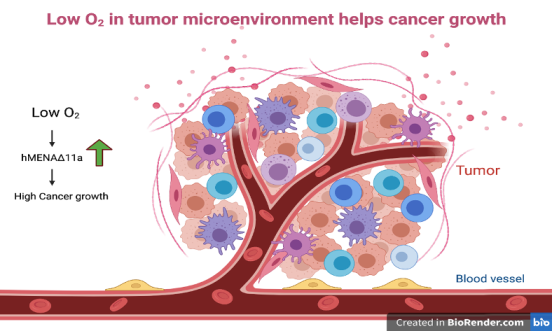
Study suggests low O2 tumors have high TGF-beta signalling that affects global transcriptome allowing the tumor to spread more.
MAR 06, 2021 | BY RATNESHWAR THAKUR, RAJESH GUNAGE
In Hypoxia condition, blood and tissues in our body are starved of oxygen. In solid tumors, due to lack of sufficient blood supply, a hypoxic environment is created which is implicated with chemo-resistance and cancer progression. The hypoxic condition is linked to the expression of a plethora of genes which help the cancer cells to adapt to oxygen-deprivation and promote cellular processes like metastasis which support cancer progression.
Although hypoxia condition is widely studied, the intriguing process of alternative splicing that leads to the biased production of oncogenic protein isoforms remains comparatively unexplored. Researchers believe that understanding the alternative splicing mechanisms of the metastatic pathway-related genes could aid to uncover previously unknown potent molecular targets for breast cancer treatment.
In a recent study, Dr. Sanjeev Shukla’s team from Department of Biological Sciences, Indian Institute of Science Education and Research Bhopal have delineated a novel mechanism of hypoxia-mediated hMENA splicing switch that promotes Epithelial to mesenchymal transition (EMT) causing the tumor cells to evade the tissue boundaries.
 Dr. Neha Ahuja, Dr. Ashok Cheemala and others from Dr. Shukla’s group used cancer patient samples and cell lines to study the impact of O2 levels and gene regulation coupled to tumor growth. They found low O2 tumors have high TGF-beta signalling that affects global transcriptome allowing the tumor to spread more. Further analysis revealed very high levels of pro-metastatic hMENA∇11a protein helping tumors to spread. This is a big discovery and targeting this protein can directly change the disease outcome, Dr. Shukla says.
Dr. Neha Ahuja, Dr. Ashok Cheemala and others from Dr. Shukla’s group used cancer patient samples and cell lines to study the impact of O2 levels and gene regulation coupled to tumor growth. They found low O2 tumors have high TGF-beta signalling that affects global transcriptome allowing the tumor to spread more. Further analysis revealed very high levels of pro-metastatic hMENA∇11a protein helping tumors to spread. This is a big discovery and targeting this protein can directly change the disease outcome, Dr. Shukla says.
The research team included Neha Ahuja, Cheemala Ashok, Subhashis Natua, Deepak Pant, Anna Cherian, Madhura R. Pandkar, Pooja Yadav, Vishnu Narayanan S.S., Jharna Mishra, Atul Samaiya and Sanjeev Shukla.
The study was published in the journal ‘NAR Cancer’ and this research work was supported by DBT/Wellcome Trust India Alliance.
Journal Reference:
Hypoxia-induced TGF-β–RBFOX2–ESRP1 axis regulates human MENA alternative splicing and promotes EMT in breast cancer
Disclaimer:
Authors claim no competing interest.


“The molecular factors of the pathway deciphered through our research regulate hypoxia-mediated EMT to promote breast cancer tumorigenesis, thus ultimately marking our study as a significant contribution towards breast cancer therapy,” he added.